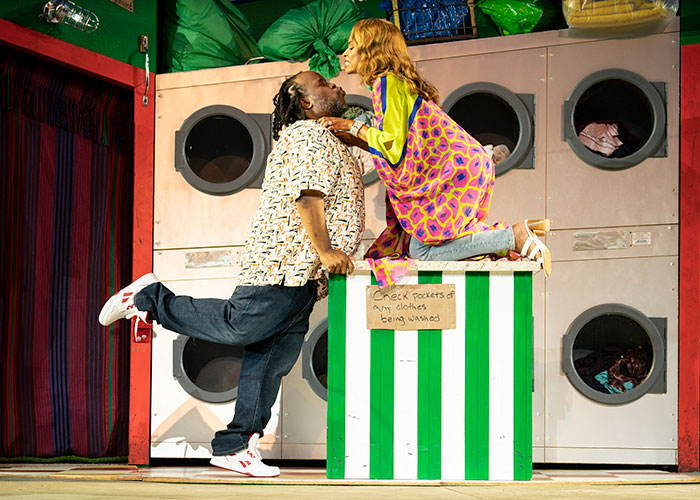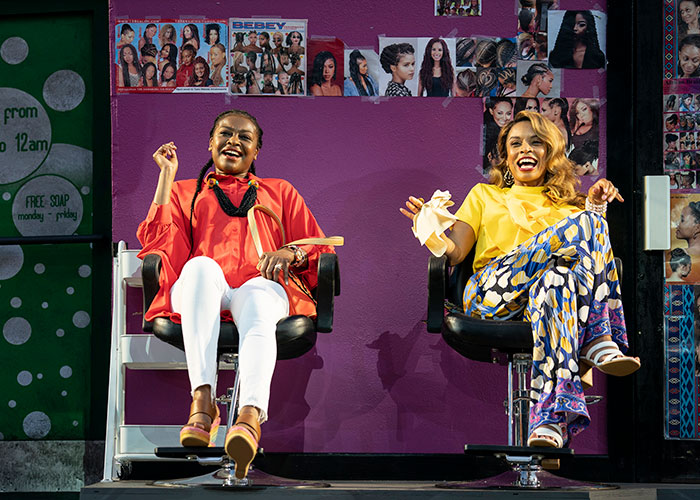Jocelyn Bioh is the queen of African comedy
Jocelyn Bioh continues to reign supreme in a lane she created for herself. Bioh is comedic playwright, focused on telling stories of the African diaspora. Her play School Girls; Or, The African Mean Girls Play debuted at MCC Theater in 2017 and instantly moved her name into conversations of theatre's finest playwrights. The Ghanaian-American's newest play, Merry Wives, a modern adaptation of Shakespeare's The Merry Wives of Windsor, opened at the Delacorte Theatre to rave reviews that solidified her spot in the Queendom.
Beyond Bioh's exceptional writing talent, she is a visionary and a creative. She began as an actor, performing in the off-Broadway productions of Bootycandy and For Colored Girls, and captured the attention of Broadway audiences in The Curious Incident of the Dog in the Nighttime. She's accomplished, with a long resume of awards and residencies to prove it. Her next play, Nollywood Dreams, will premiere at MCC Theatre this fall, and it's described as a romantic comedy set in Nigeria in the 1990s.
As she continues to bring in full audiences to the Delacorte, and prepares for the show's Black theatre night on September 2, Bioh chatted about Merry Wives and her intention and attention to every detail of the play.

You mentioned on opening night that you weren't sure if you would do Merry Wives in the beginning. What were your reservations about this play?
My apprehension was more about adapting a Shakespearean text. I've never done an adaptation before. I had no idea what kind of work that would entail, if I would be any good at it, or how I could make it feel fresh and fun and exciting and if the storytelling would remain clear. It felt like a big daunting task. So I just wasn't sure it was something I wanted to do and knew how to do. So it took a lot of convincing from [director] Saheem [Ali] about what I could do with it. He felt super confident that I was the right person for the job and he's like my theatre husband. So I trust his instincts as well. And so, I said to myself, "I'll read it and if I feel like it sparks with me, I will try hand at it." And it did.
Let's talk about the role Instagram played in getting people familiar with this adaptation. You are a playwright and have also become a social media influencer. Your Instagram stories really pulled people in to be connected to the developmental process of this show.
I have a very funny relationship with social media. I became very overwhelmed, in a good way, with the excitement that people had about the return of Shakespeare in the Park. I truly underestimated how much people were invested in the return of theatre. So even way back in March when the press release first came out, I was working or other stuff, and my phone was blowing up. I had no idea people would even care that much. And then I think people were also just curious. I wanted to document a lot of what we were going through with testing and being masked and certainly the way the story shifted when we moved into Central Park.
I'd say that the rehearsal process before we arrived at the Delacorte was pretty humdrum, other than limited people in a rehearsal room and me having to be masked a lot of the time which was fine. But once we got into the park and we were now dealing with so many crazy things, especially the weather and it was wild. And I had never done outdoor theater before in this capacity. I wanted people to have a clear understanding of this is not as easy as you think it is. It's really, really hard and really emotional. And I wanted people to see all of that. So yeah. I decided to share, especially our tech and preview process.
As a playwright, you're so intentional with everything you do, from social media to this show. Can you talk about the intention behind setting Merry Wives in Harlem?
That idea was from Saheem. He came to me with two things that he thought would be perfect for this adaptation: he wanted it to be set in Harlem and that he imagined that it would all take place in a hair braiding salon. When I read the play myself, I already had those two things in mind and then knew how I could really dive deep into this particular world. So the idea was not mine originally, but because Saheem knows that I write African comedy and we worked together on so many things, he knew I would very easily be able to create this world.
And in a lot of ways, the original Merry Wives of Windsor is a pretty nationalist play. It makes fun of everybody who's not British, and Shakespeare really went to great lengths to do that. It's a pretty misogynist play that really censors women and even though the play is called Merry Wives, the women are pretty ancillary characters. I wanted to just re-sensor that. When you now create a play that's set in Harlem and everybody is within the Black diaspora of West African descents or Caribbean descent or Black American, it pretty much clearly removed all of the nationalist elements from it.

I remember the early 2000s getting off the train in Harlem and being met with these beautiful Black women who were all trying to get me into their hair braiding salons. It's how you knew you were in Harlem. I feel like you captured that neighborhood so perfectly with the salon, clinic, and laundromat. Can you talk to me about those specific scene choices.
We knew we wanted to keep everything pretty central and local, and we wanted to make it feel like a neighborhood. We wanted to really to show that on this particular block, everybody who lives there generally knows each other. We also wanted to highlight that these were Black-owned businesses that everybody in the community supported. In real life, my brother is a doctor and has a private practice in Harlem, right on 125th Street. I wasn't reaching in any way by making the clinic right on the corner. We wanted to highlight entrepreneurship and where everybody congregates, gets their hair done, and where they all wash their clothes. We wanted to capture the real sense of community that I got from the original text.
You mentioned earlier that you included the entire Black African diaspora. Why was it important to include everyone in this reworking?
I really feel like we are stronger together and that's also the kind of idea of what Harlem is to me. It is a mashup of different Black cultures coming together and forming one new community. I live in Harlem now and everybody who lives on my block is from various walks of Black life. We all know each other, and we all form a community and bond together. I loosely based it on 116th Street and wanted to accurately reflect and depict what I saw. It felt natural to me to create a space that was super inclusive, full of Black joy, and that could make everybody feel universally like they were a part of this community.
You chose to include two same-sex relationships in this story. And it felt especially important to frame this around a community that still has a rooted bias around the LGBTQ community. Why did you feel this was an important element to add?
I think that we have to understand that I think at the root of people who don't have an understanding of the LGBTQ+ community is just not seeing people's humanity. People just want to be who they are and love who they love. And honestly, none of that is my business. I just wanted to speak to the humanity and the very natural human feelings of love. It wasn't an agenda. It wasn't like I'm trying to push something on someone. It felt so seamless and natural to just make that change. The intention was to just speak to the realness of love in that it can be found in anyone, in any place, anywhere.
Dede Ayite's costume design really set up the storytelling of Merry Wives. Did you have any influence in this department?
I love that her costume design is getting so much love and praise. I think it's two-fold. One is that you have to work with designers who have a very clear understanding of your vision that you actually don't do too much. Dede is really an artist. So on the page she can read Madam Page and Madam Ford and have a very clear understanding of who these two women are and what they would look like, and how they would dress. These are socialites in the community. She gets it. She's just a really keen and smart costume designer in that way.
And then in another way, I think this is totally the best commercial for why you should hire people who have a clear understanding of the communities, people and cultures that are on the stage. And it's not just because Dede is first-generation Ghanaian and that automatically qualifies her to be a costume designer. It's because of her level of understanding of the culture that qualifies her to be the best designer for this show. Only somebody with that clear, deep rooted understanding of culture throughout the diaspora, not just African, but Black American. She had a clear understanding of what that is and was able to have the budget to reflect all of it. All I said to her at the end was like, "Look, I want a big African wedding for the curtain call. I think that would be so fun." And she was like say, "Say less."

Who was your favorite character to rewrite and develop?
Falstaff is grimy and sleazy in our version, but in the original text he's so misogynous and I just don't like him. He doesn't feel as lovable and I wanted to make Falstaff feel fun and lovable, and that you could relate to him. I wanted to make him like a sleaze ball, but you're also like, "I like you a little bit. You're funny." You're on the journey with him. And Jacob [Ming-Trent] is such an incredible gifted performer. He's so great with comedy. It really made it very easy to find this new version of Falstaff. So I really enjoyed that. And then I think the wives. I just had so much fun playing with creating these kinds of real Housewives of Africa who were smart and witty and cunning and were just beautiful and regal all at the same time. I love being able to give them that kind of color and variety. So I had a really good time with all three of those characters.
Has anyone called you the queen of African comedy yet?
I have never heard that, but I hope and will continue to vow that I will live up to that title.
Originally published on
